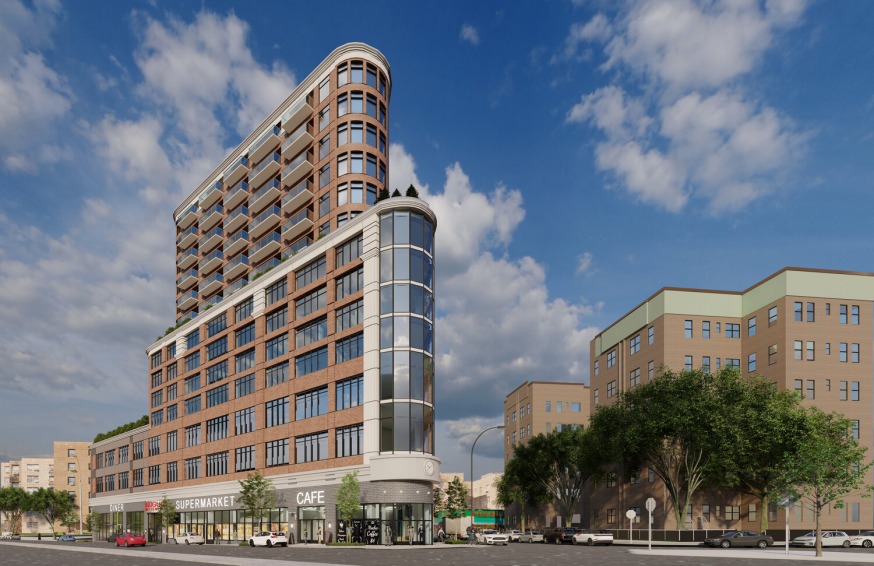
Rendering of the proposed development planned to go up at 98-81 Queens Blvd. (RJ Capital Holdings)
Dec. 22, 2021 By Allie Griffin
Queens Community Board 6 rejected a developer’s rezoning application that seeks to replace a popular Rego Park diner and synagogue on Queens Boulevard with a 15-story mixed-use building.
The board, which represents the neighborhoods of Rego Park and Forest Hills, voted 20 to 19 against the plan during a virtual meeting on Dec. 8.
The plan calls for the demolition of several buildings on a large triangular block — occupied by the Tower Diner, Ohr Natan Synagogue and various small businesses — to make way for apartments and retail space.
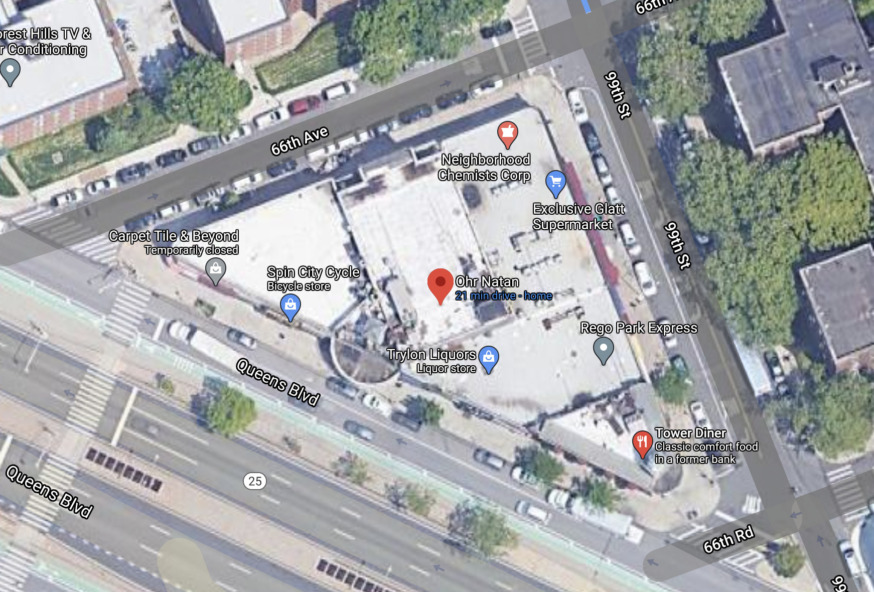
The large triangular lot that RJ Capital Holdings seeks to rezone and develop. The property is essentially a city block that goes from 66th Avenue to 66th Road on Queens Boulevard all the way around to 99th Street and 66th Avenue (Google Maps)
The application, submitted by RJ Capital Holdings, proposes constructing a 153,400-square-foot building at 98-81 Queens Blvd that would include 17,400 square feet of retail space and 144 units — 44 of which would be “affordable” pursuant to the city’s Mandatory Inclusionary Housing requirement. The plan requires the site to be rezoned and therefore must be approved by the city before it can move forward.
However, neither the community board nor the city can stop RJ Capital from demolishing the buildings — and putting up a new development — since the property is not landmarked. The community board is only able to provide a yes or no recommendation on the developer’s upzoning plans, not its demolition plans.
RJ Capital can build an apartment complex — albeit smaller — as of right. In fact, the company said it would construct a 103-unit building with zero affordable apartments if its rezoning application were to be rejected.
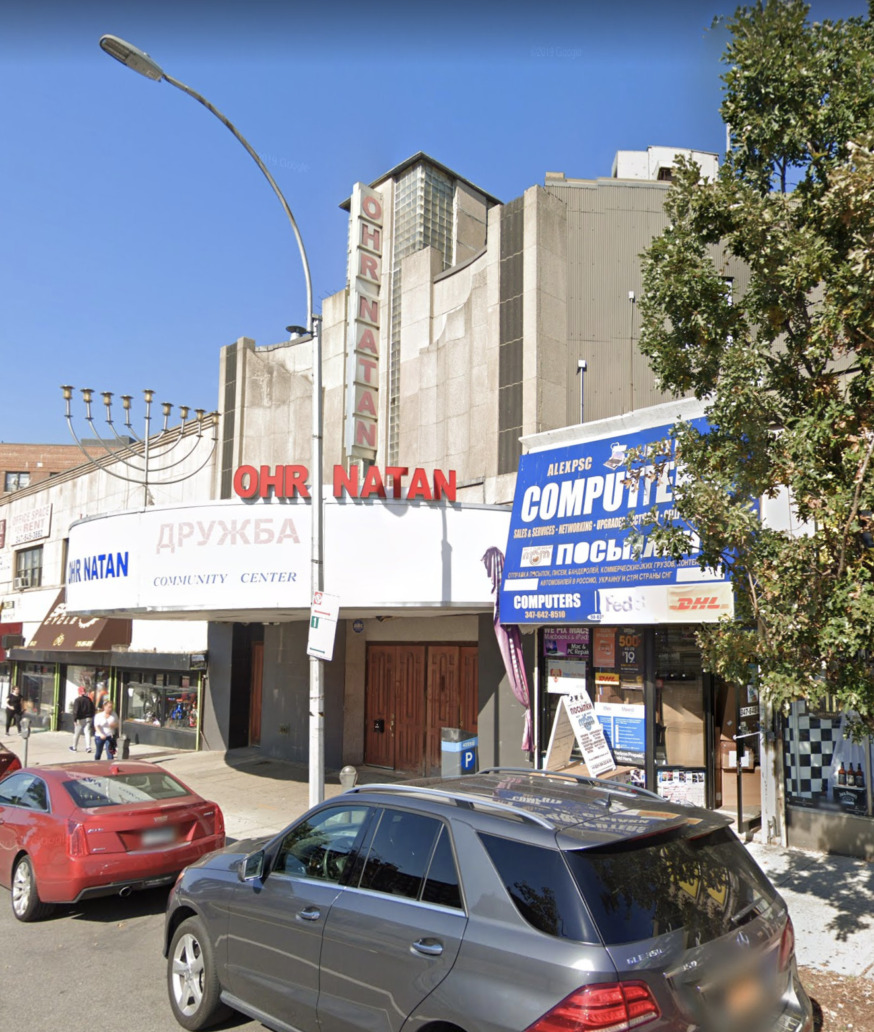
Ohr Natan Synagogue, at 98-81 Queens Blvd. (Google Maps)
The local community board is the first to review and vote on the plan in the process used by the city to assess rezoning applications — the Uniform Land Use Review Process.
Next, it goes to the borough president, who offers his own recommendation on the plan.
Both Community Board 6’s vote and Richards’ future recommendation are only advisory. The City Council has the ultimate say as to whether RJ Capital’s rezoning application gets approved.
The advisory recommendations, however, do influence how the city council votes.
Nonetheless, Queens CB6 provided the developer with a series of suggestions — along with its rejection — as to how the plan could be improved and be made more beneficial to the neighborhood. The CB6 Land Use committee drafted a wish list based on feedback from Rego Park and Forest Hills residents.
“Our committee took a lot of [the public’s] comments into account as we made our ultimate recommendation, so you’ll hopefully see a lot of these comments reflected in our recommendation,” Land Use Chair Prameet Kumar said at the meeting.
The board called for some of the affordable apartments to be offered to people with much lower incomes than what the plan currently proposes.
RJ Capital plans to offer 44 units — approximately 30 percent of the 144 apartments — to residents who earn 70, 80 or 90 percent of the area median income in accordance with city requirements. For a family of four, 80 percent of the AMI equates to $95,440.
CB6 wants the developer to offer some of those units to residents who earn 60 percent or lower of the area median income. At 60 percent AMI, the threshold for a family of four would be $71,580.
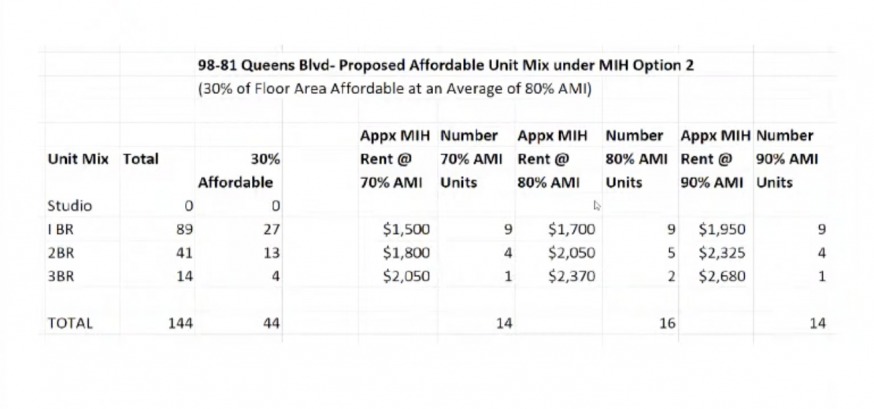
Affordable units to be offered in the new building via the MIH (RJ Capital Holdings presentation)
The board members also called for the developer to incorporate some of the distinct architectural elements of both the Tower Diner and the original Trylon Theater — where the synagogue is now located — into its new building design.
The request aims to appease dozens of residents who are opposed to the demolition of the building. They say the architecture of the two buildings is an important part of the neighborhood. For instance, the Tower Diner features an iconic clock tower and the synagogue occupies the building that once was the historic Art Deco-styled Trylon Theater, which opened in 1939 and closed in 1999.
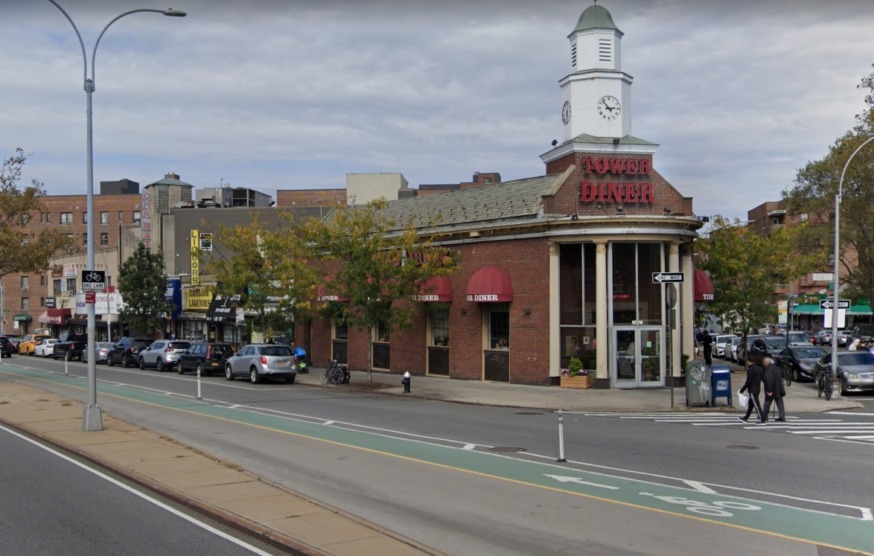
The proposed development would involve demolishing a block of building including the Tower Diner (Google Maps)
A petition to save the buildings and small businesses located on the triangular block — bordered by Queens Boulevard, 66th Avenue and 99th Street — has garnered more than 4,000 signatures.
The board had other requests. It called on RJ Capital to ensure its development is environmentally friendly in accordance with LEED Gold or Platinum certification.
It also asked the company to use contractors who pay workers a prevailing wage; employ union workers; reduce the disruption construction will cause to road users on Queens Boulevard; and provide current retail tenants preference for the new commercial space.
The development company has already refused to meet several of the board’s demands, including offering housing at a lower income bracket, during prior discussions and public hearings.
Richards will be next to issue a recommendation on the application. Then the application will go up for a vote within the City Planning Commission before it is turned over to the City Council.
Council Member-elect Lynn Schulman, who will take office on Jan.1, will be representing the district when the rezoning comes up for a vote in the city council. Her vote is likely to determine the fate of the project. The council typically votes in lockstep with the representing member on land use matters in a practice known as “member deference”.
3 Comments




This is a done deal. The diner moved. Already. The synogogue. Moved already.
How many more buildings will go up before a school or a nursing home will be built? Our schools in both Rego Park & Forest Hills are all well over capacity & have no more room for children who will be moving in if we keep buildings. This is horrible that all these buildings are coming up. We have no where to put the kids or the elderly. We have no more parks or community spaces. Build a school before you all start talking more homes.
I am glad, and a bit surprised that the Community Board rejected the developer’s rezoning plan, even if only by I measly vote. But as the article reports, the developer can still basically do what it wants – and we all know that they will!
My point is that no developer cares about ANY thing other then making money – as much and as quick as they can! Neighborhoods, history, traditions or human beings ourselves mean absolutely nothing to them and they will continue to destroy, divide and “uglicize” our neighborhoods, boroughs and city; their idea of “affordable housing” would almost be funny if it wasn’t so tragic. And also if people started caring about each other again, instead of only be concerned with how they can scrounge, scam and use legal loopholes to sweep up every last dime from the gutters.
The people, actual people, who run and work for these bid developers, as well as for the lawyers, accountants, etc should be ashamed, not able to sleep at night – but I’m sure they sleep real well in THEIR private homes and neighborhoods!!